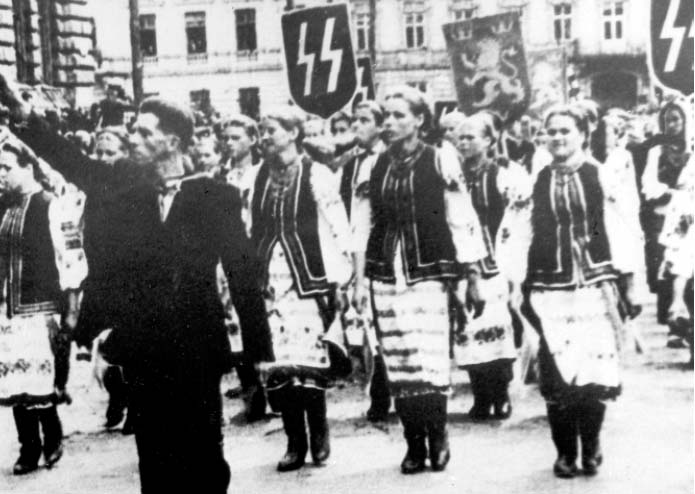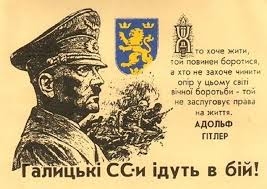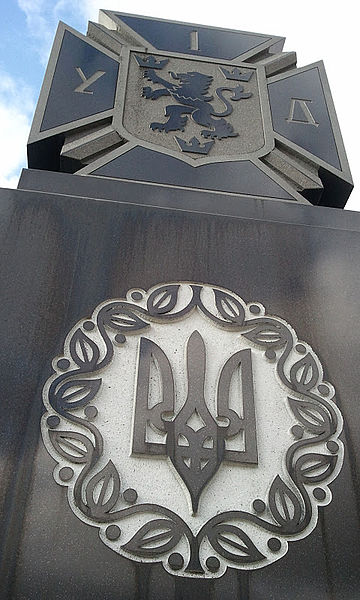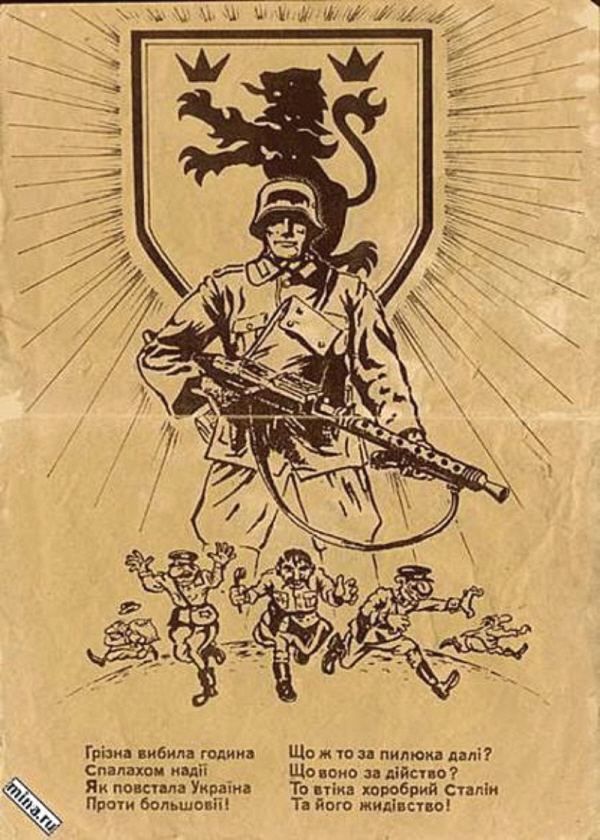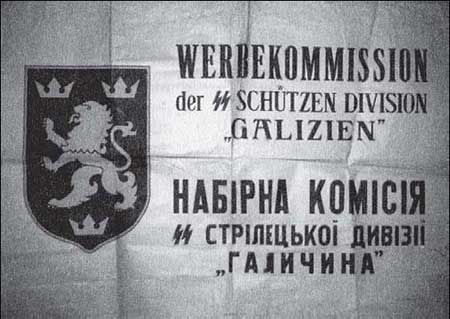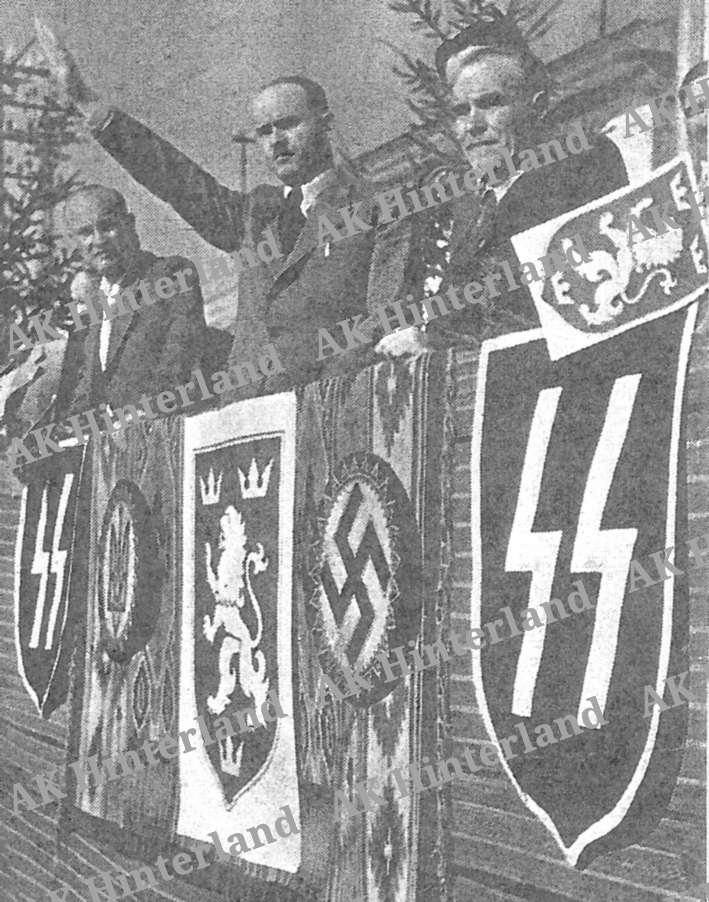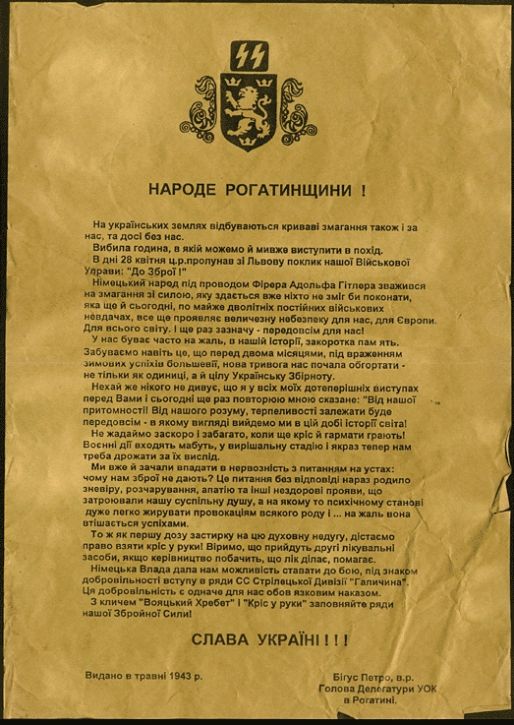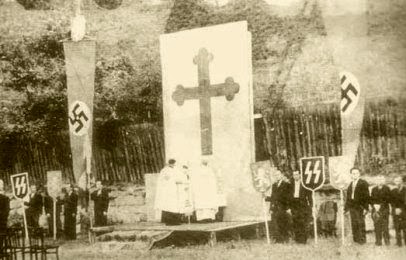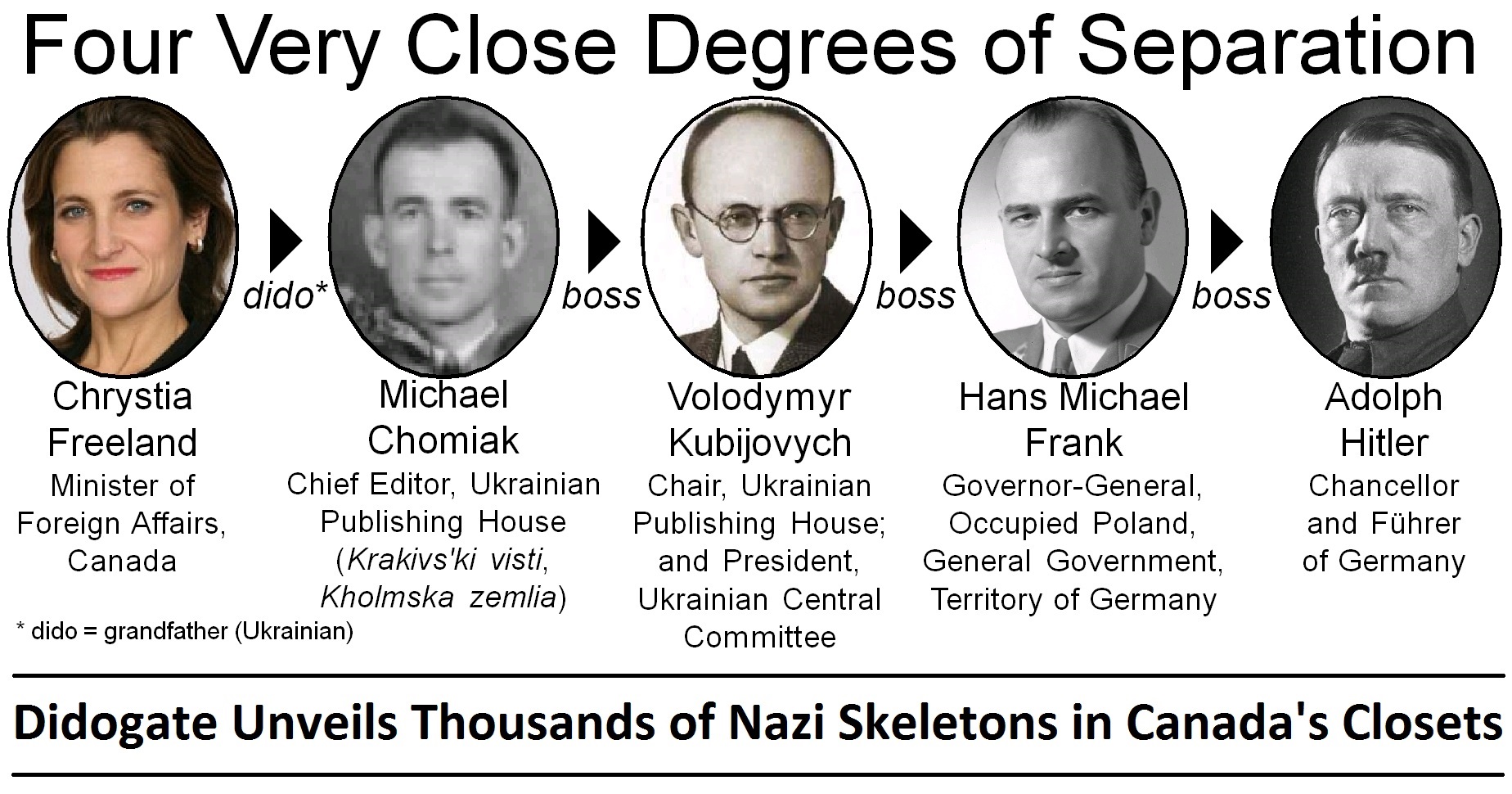
Minister Freeland's Grandfather,
Fake News,
|
|
|
By Richard Sanders, editor, Press for Conversion! magazine of the Coalition to Oppose the Arms Trade, March 22, 2017 "It takes a village to raise a Nazi" (old African proverb, slightly modified) |
|
|
1- Introduction 2 - The Liberal Government's Warm Embrace of Ukraine's Nazi Collaborators 3 - Historical Amnesia and the Blinding Effects of Propaganda 4 - The Nazis as Victims? Sure, just Blame the Russians! 5 - Canada needs Truth and Reconciliation, not Denials and Obfuscation 6 - Historical Denial among Canada's ultranationalist Ukrainians 7 - Michael Chomiak, The Ukrainian Central Committee and its Nazi Newspapers 8 - Aryanisation and the "Mighty Wurlitzer" 9 - The Ukrainian Canadian Congress and its Fascist Roots 10 - Getting them Early: Building the ultraNationalist Cause among Children and Youth 11 - The Freeland-Chomiak Parallels in Advocacy Journalism 12 - Was Freeland an "Accidental Journalist," or Groomed for the Job? 13 - In 1989, Freeland was Declared an "Enemy of the Soviet State" 14 - A Chomiak-Freeland Fixation on Jewish Oligarchs running the Kremlin 15 - Freeland's Kremlin-Oligarch Theory goes Global with Jewish Plutarchetype 16 - Institutionalised Confidence Scams: An Open Conspiracy of Oligarchs, Politicians and Journalists 17 - Escaping the War Racket starts with Seeing the Elephant 18 - Just Following Orders? Which Orders? 19 - Is there a Bear in the Room? Kill it! 20 - The Collective Care and Feeding of Russophobia 21 - The Need for Truth and Reconciliation
If you appreciate the work that went into this research, please
subscribe &/or donate.
You can mail this
coupon
to COAT, or use the
Paypal link
on our homepage. Subscription prices:
Captive
Canada: This issue (#68) deals with the mass internment of Ukrainian Canadians, this community's left-right split and the mainstream racist, xenophobic anti-communism of progressive "Social Gospellers" (like the CCF's J.S. Woodsworth) who were so captivated by their false beliefs that they carried out the genocide of First Nations and turned a blind eye to government repression during the 20th-century "Red Scare." The main thesis is captured
here: Below is the advertisement that appeared on the same page as the conclusion of the article by Chrystia Freeland and David Marples, "Memory of Ukraine's famine emerges from official historic amnesia," Ukrainian Weekly, August 28, 1988, pp.2, 13.
|
Part 12 Although the official narrative states that Freeland's journalistic career began in her early 20s when she suddenly started writing for some of the world's largest corporate newspapers while she was in Ukraine, the reality is that Freeland had started along this path as early as 1986. In that year, at age 18, Freeland got a Canadian government-funded summer job with the University of Alberta's Canadian Institute of Ukrainian Studies (CIUS). The CIUS, a part of the University of Alberta in Edmonton had been created through Alberta government funding in 1976.[i] Freeland's job involved writing articles for a CIUS print project called the Encyclopedia of Ukraine.[ii] Kubijovych, who was her grandfather's former wartime boss, was the mastermind behind this encyclopaedic effort to rewrite Ukrainian history. He had just died in 1985, the year before Freeland started writing articles for his encyclopedia.
Then, in the late 1980s, at about age 20, just before heading off to Harvard for her BA, Freeland worked for The Ukrainian News[iii] in Edmonton. This was the second, ultranationalist stepping stone in her journalistic career. For many decades, this Ukrainian-language weekly, has been a strong print-media vehicle for strident ultranationalist Ukrainian perspectives in Canada.[iv] In her work for this paper, she must have been guided by its editor and publisher, Marco Levytsky. He has led this Canada-wide Catholic Ukrainian newspaper since 1982, when he took over its editorial helm from Freeland's Ukrainian dido, Michael Chomiak.[v]
Levytsky has also embroiled Ukrainian émigrés in controversy by writing articles and editorials supporting such prominent members of their community as Myron Kuropas. Professor Kuropas has, over many decades, continued to fixate on ruminations that Jews played a major role in victimising Ukrainians before, during and after WWII. Despite editorial support from Levytsky at The Ukrainian News, Kuropas has been accused of antiSemitism.[vii] As an early stepping stone on Freeland's career path, working for The Ukrainian News likely helped to confirm her already deeply ingrained perceptions about Ukrainian politics. A third stepping stone in Freeland's early journalistic career was The Ukrainian Weekly, a US-based newspaper catering to the interests of Ukrainian nationalists throughout North America. Freeland's byline appeared in this newspaper in 1988 and 1990 when she was a BA student in "Soviet Studies" at Harvard. As might be expected, her contributions followed the paper's extremely antiSoviet/anticommunist approach. While constantly poking the finger at Soviet flaws and blindspots, this periodical has helped the nationalist Ukrainian community to turn a blind eye from the horrors of its Nazi collaborationist past. Besides featuring a bi-monthly column by Myron Kuropas, The Ukrainian Weekly has relied heavily on news material supplied by Radio Free Europe and Radio Liberty (RFE/RL). The newspaper has literally used thousands of stories fed by RFE/RL[viii] which was the CIA's main media juggernaut throughout the Cold War, and continues to pump out vast amounts of US-government propaganda.
The conclusion of an article by David Marples and Chrystia Freeland in 1988 appeared on the very same page of The Ukrainian Weekly as an ad for a book glorifying the heroes of the Waffen SS Division Galicia.[xii] (See that black-and-white ad in the left column, below.) This was the same Nazi military division that her grandfather's two newspapers had passionately urged Ukrainians to join in 1943. The book, called Fighting for Freedom: The Ukrainian Volunteer Division, with 128 pictures, is one of many proNazi books written by Richard Landwehr which romanticise the Nazi SS. Ads for Landwehr's book glorifying the Waffen SS Galicia appeared in at least sixteen other issues of The Ukrainian Weekly in 1988.[xiii] (Continue reading this article)
Note the Waffen SS
Galician symbol (a lion with three crowns)
in each of the following images.
The third image below is a public monument commemorating
the Waffen SS Galicia in Oakville Ontario:
|
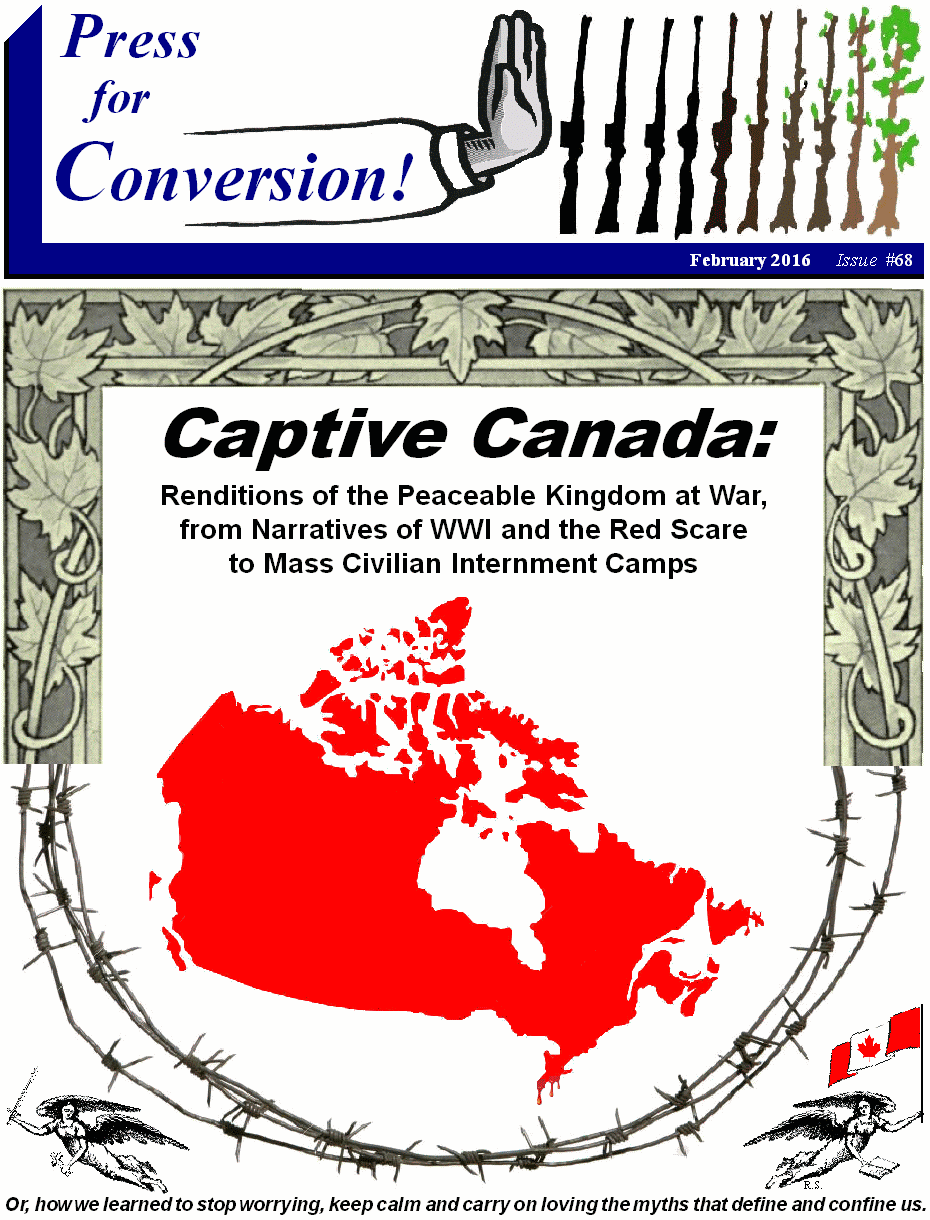

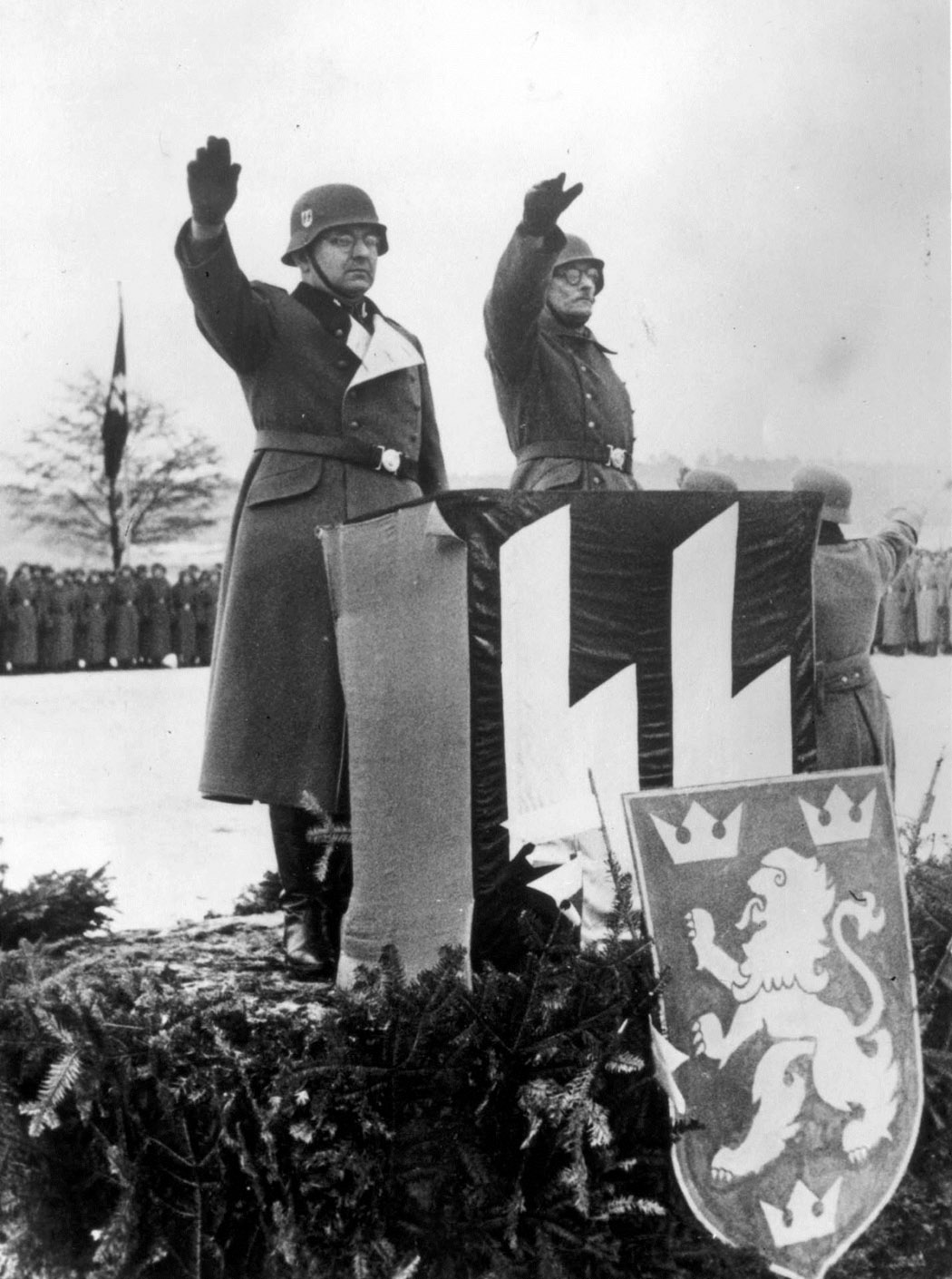
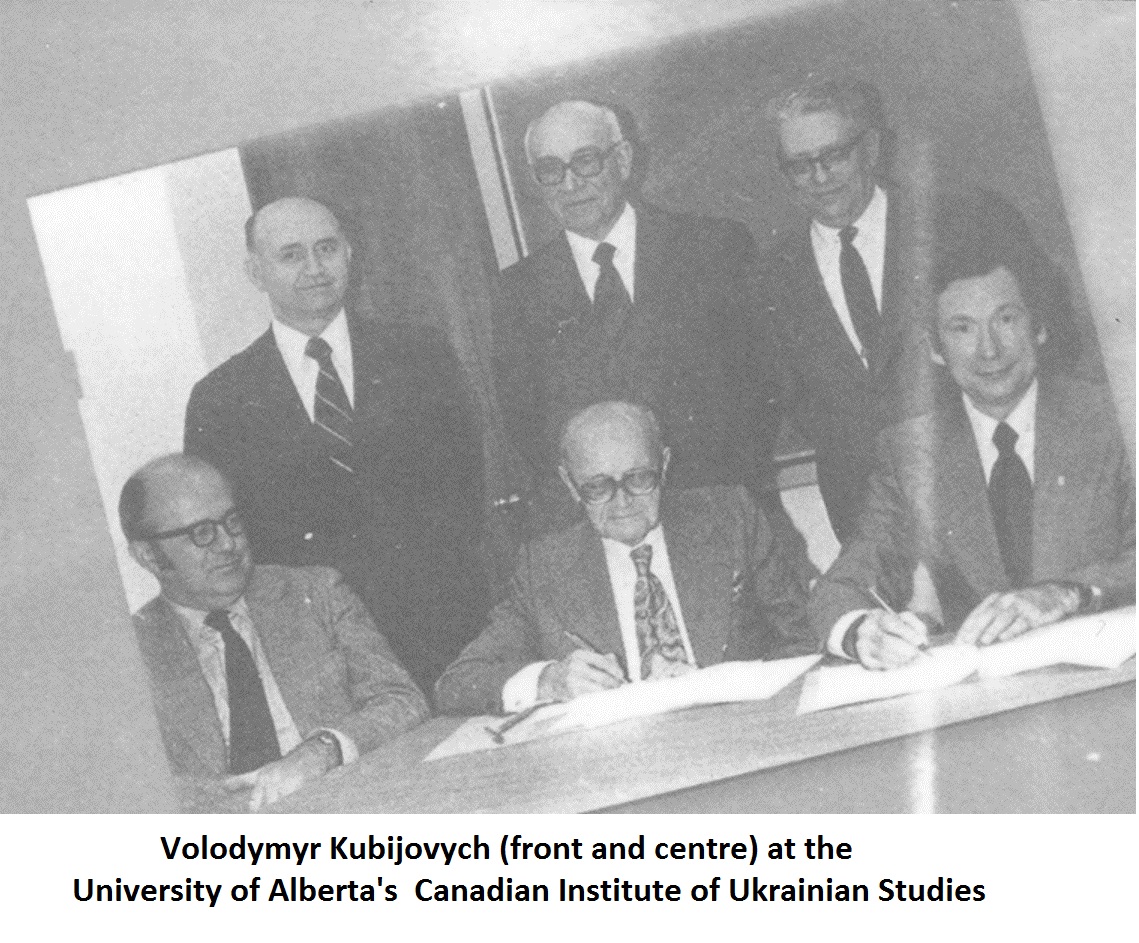 After leading
After leading 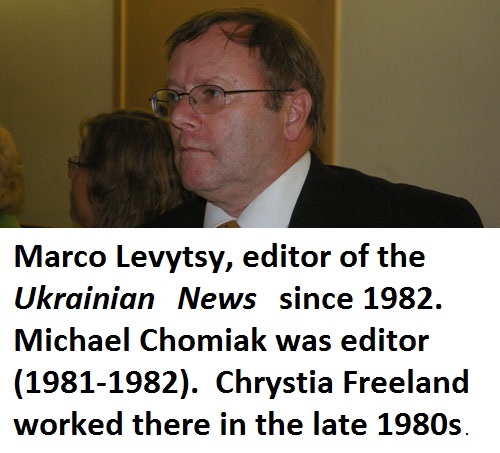 For the 35 years since then, Levytsky has used this newspaper to promote
his community's brand of patriotism for Ukraine, its support for Ukrainian
WWII veterans and the acute Cold War politics for which they should be
famous. Some historians have critiqued Levytsky's repeated reliance on
forged documents (i.e., fake news) to whitewash Ukrainian complicity in the
Holocaust.
For the 35 years since then, Levytsky has used this newspaper to promote
his community's brand of patriotism for Ukraine, its support for Ukrainian
WWII veterans and the acute Cold War politics for which they should be
famous. Some historians have critiqued Levytsky's repeated reliance on
forged documents (i.e., fake news) to whitewash Ukrainian complicity in the
Holocaust. The RFE/RL was created in the late 1940s as
a massive CIA propaganda program. Its website now proudly claims credit for
having spread "news and information to audiences behind the Iron Curtain"
which "played a significant role in the collapse of communism."
The RFE/RL was created in the late 1940s as
a massive CIA propaganda program. Its website now proudly claims credit for
having spread "news and information to audiences behind the Iron Curtain"
which "played a significant role in the collapse of communism."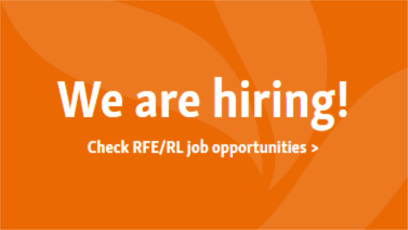 Like other aspiring mainstream journalists
writing about Ukrainian nationalism and other issues critical of the Soviet
Union, Freeland also received a helping hand from the RFE/RL. In 1990,
during the Soviet Union's last days, Freeland helped conduct an interview
for Radio Liberty with a founder of Ukraine's separatist movement, "Rukh."
Like other aspiring mainstream journalists
writing about Ukrainian nationalism and other issues critical of the Soviet
Union, Freeland also received a helping hand from the RFE/RL. In 1990,
during the Soviet Union's last days, Freeland helped conduct an interview
for Radio Liberty with a founder of Ukraine's separatist movement, "Rukh."